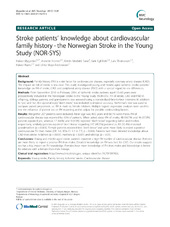| dc.contributor.author | Øygarden, Halvor | en_US |
| dc.contributor.author | Fromm, Annette | en_US |
| dc.contributor.author | Sand, Kristin Modalsli | en_US |
| dc.contributor.author | Eide, Geir Egil | en_US |
| dc.contributor.author | Thomassen, Lars | en_US |
| dc.contributor.author | Næss, Halvor | en_US |
| dc.contributor.author | Waje-Andreassen, Ulrike | en_US |
| dc.date.accessioned | 2016-03-18T08:50:39Z | |
| dc.date.available | 2016-03-18T08:50:39Z | |
| dc.date.issued | 2015-03-12 | |
| dc.Published | BMC Neurology 2015, 15:30 | eng |
| dc.identifier.issn | 1471-2377 | |
| dc.identifier.uri | https://hdl.handle.net/1956/11698 | |
| dc.description.abstract | Background: Family history (FH) is a risk factor for cardiovascular disease, especially coronary artery disease (CAD). The impact on risk of stroke is less clear. This study investigated young and middle-aged ischemic stroke patients’ knowledge on FH of stroke, CAD, and peripheral artery disease (PAD) with a special regard to sex differences. Methods: From September 2010 to February 2014, all ischemic stroke patients aged 15–60 years were prospectively included in the Norwegian Stroke in the Young Study (NOR-SYS). FH of stroke, CAD and PAD in offspring, siblings, parents, and grandparents was assessed using a standardized face-to-face interview. In addition to ‘yes’ and ‘no’, the optional reply ‘don’t know’ was included to improve accuracy. McNemar’s test was used to compare paired proportions, i.e. FH in male vs. female relatives. Multiple logistic regression analyses were used to test the influence of patient sex on FH reporting and to adjust for possible confounding factors. Results: Altogether 257 patients were included. Mean age was 49.5 years and 68.1% were males. FH of cardiovascular disease was reported by 59% of patients. When asked about FH of stroke, 48 (18.7%) and 46 (17.9%) patients reported yes, whereas 17 (6.6%) and 9 (3.5%) reported ‘don’t know’ regarding father and mother respectively, similarly patients reported ‘don’t know’ regarding 117 (45.5%) paternal vs. 83 (32.4%) maternal grandmothers (p < 0.001). Female patients reported less ‘don’t know’ and were more likely to report a positive cardiovascular FH than males (OR: 3.4; 95% CI: 1.5 to 7.7; p = 0.004). Patients had more detailed knowledge about CAD than stroke in fathers (p < 0.001), mothers (p < 0.001) and siblings (p = 0.01). Conclusions: Young and middle-aged stroke patients reported a high FH burden of cardiovascular disease. Females are more likely to report a positive FH than males. Detailed knowledge on FH was best for CAD. Our results suggest sex has a big impact on FH knowledge. Females have more knowledge of FH than males and knowledge is better for relatives with a female than male linkage. | en_US |
| dc.language.iso | eng | eng |
| dc.publisher | BioMed Central | eng |
| dc.relation.ispartof | <a href="http://hdl.handle.net/1956/12079"target="blank">Family history in young and middle-aged acute ischemic stroke patients. The Norwegian Stroke in the Young Study</a> | eng |
| dc.rights | Attribution CC BY | eng |
| dc.rights.uri | http://creativecommons.org/licenses/by/4.0 | eng |
| dc.subject | Young stroke | eng |
| dc.subject | Family history | eng |
| dc.subject | Ischemic stroke | eng |
| dc.subject | Cardiovascular disease | eng |
| dc.title | Stroke patients’ knowledge about cardiovascular family history – the Norwegian Stroke in the Young Study (NOR-SYS). | en_US |
| dc.type | Peer reviewed | |
| dc.type | Journal article | |
| dc.date.updated | 2016-02-05T08:15:33Z | |
| dc.description.version | publishedVersion | en_US |
| dc.rights.holder | Copyright 2015 The Authors | |
| dc.identifier.doi | https://doi.org/10.1186/s12883-015-0276-6 | |
| dc.identifier.cristin | 1329158 | |

